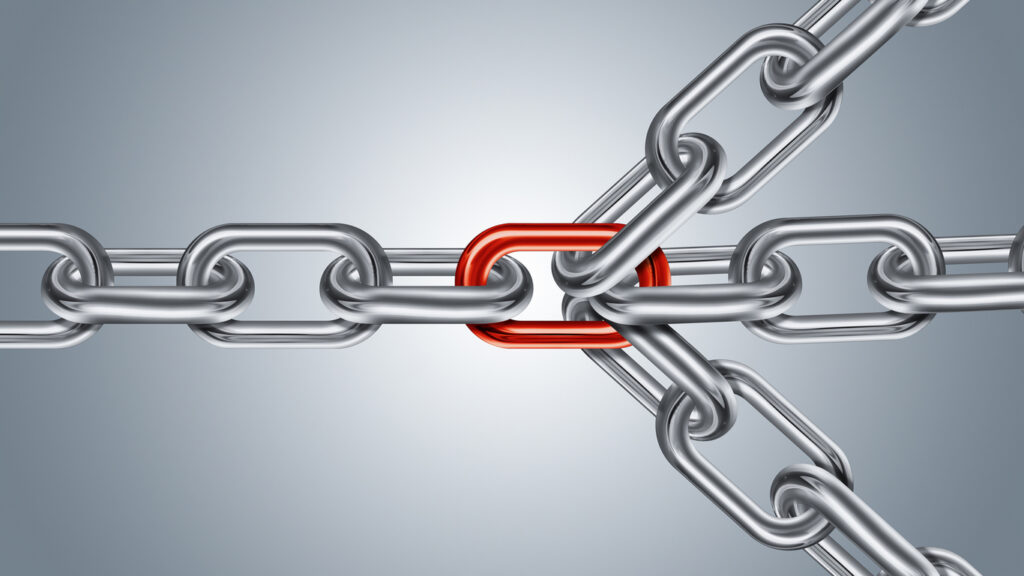Key Takeaways:
- Due diligence is an increasingly important aspect of supply chain risk management and business relationships.
- Due diligence clauses in transactional contracts can mitigate risk throughout the supply chain.
- Laws addressing ESG matters or export controls may warrant specific due diligence clauses to ensure adherence to legal obligations.

When drafting supply chain contracts, don’t overlook the importance of due diligence clauses. Failing to do your due diligence could mean engaging an unreliable supplier who may not adhere to regulatory requirements and could have substandard quality control practices. This could lead to not only reputational damages for your business but also legal consequences.
Incorporating due diligence into the contract establishes due diligence as a priority for both parties and provides a mechanism for enforcement. This article covers the importance of due diligence clauses in supply chain agreements, provides sample language to adapt to your party’s needs, and provides nuances for ESG and export control due diligence clauses.
Due Diligence as a Supply Chain Issue
Due diligence is no longer limited to the pre-contractual phase of an agreement. Consumer interest, stakeholders, and new laws emphasize that a business’s responsibility for its products extends throughout the supply chain. US and foreign laws and regulations, as well as company stakeholders, may require ongoing due diligence throughout the term of the contract.
Businesses can use contract terms to emphasize the importance of due diligence to both parties and ensure that due diligence will extend to the supplier’s sub-contractors and sub-suppliers. Based on the ultimate agreement between the supplier and end customer, downstream suppliers may need to include a similar due diligence clause in their own contracts with their sub-contractors and sub-suppliers to ensure that due diligence applies to all parties involved in the manufacturing of a product.
Before entering into a contract with a supplier, businesses often ask the potential supplier to complete a due diligence questionnaire. This questionnaire can provide the business with much of the information it needs to conduct due diligence. The questionnaire includes information such as company location and ownership, legal status, major business activities, relevant financial information, key company leaders and senior employees, and business outlook. The business can then evaluate any red flags raised by the questionnaire. Buyers can also require suppliers to periodically update the questionnaires.
Businesses can mitigate disruption risks with an emphasis on resiliency rather than efficiency. Developing a strong relationship with suppliers can also lessen the impact of disruptions by encouraging transparency and communication. Proactive planning, having sufficient inventory, alternate suppliers, and alternate transportation arrangements provide businesses with the flexibility to respond to disruptions.
Download Bloomberg Law’s Buyer’s Guide to Contract Management Software to get actionable insights to help you select and implement the most effective solution for your team.
Sample Language
Virtually all businesses are part of a supply chain, and any given business is often both a buyer and a seller within the chain. As the importance of due diligence rises, more businesses are including a specific due diligence clause in their contracts. The clause below provides model language for a supply chain due diligence clause and is adaptable to address the parties’ needs.
Section X. Supply Chain Due Diligence. Seller agrees to respond fully and promptly to Buyer's due diligence questionnaires. Seller agrees to notify Buyer promptly of any changes to its production or procurement processes that may impact Seller’s contractual or legal commitments.
Buyer will provide to Seller all relevant materials that specify Buyer's due diligence standards and expectations.
Supplier shall make all due diligence information available to Buyer within [time period] upon Buyer’s request.
Supplier further agrees to evaluate and address risks of disruption within its supply chain; to monitor its vendors and conduct audits to evaluate compliance with contractual and legal obligations; to require Supplier's direct vendors to make appropriate compliance certifications; and to develop and maintain compliance plans that include appropriate engagement and training of employees, vendors, and other stakeholders.
Supplier agrees to take appropriate remedial action if established metrics are not met. Remedial action may include the development of a corrective action plan, termination of the relationship, or other actions as appropriate.
The Parties recognize that due diligence is an ongoing obligation throughout the contract's life. To ensure ongoing compliance with both the contract and legal requirements, the Parties will adopt measures to undertake regular due diligence monitoring, including periodic auditing.
Download Bloomberg Law’s complimentary due diligence checklist for distributors with a focus on supply chain issues in a distribution transaction.
ESG and Export Controls Due Diligence Clauses
Contracts that involve ESG issues or export controls may warrant a due diligence clause tailored to specific legal obligations.
ESG Issues
One ESG issue that is top-of-mind for US parties is forced labor. Section 307 of the Tariff Act of 1930 and the Uyghur Forced Labor Prevention Act (UFLPA) prohibit the importation of goods made with slave labor.
ULPFA in particular requires substantial due diligence to overcome its presumption that all goods made in the Uyghur region of China are made with forced labor. To demonstrate the scope of UFLPA, US customs has reportedly blocked the entry of thousands of vehicles under UFLPA, alleging that a sub-part of a part was made with Uyghur forced labor.
US buyers of foreign products may wish to include a due diligence clause in their contracts that requires the overseas party to undertake appropriate due diligence on their own suppliers to address forced labor or other ESG issues.
Some overseas businesses may lack the capacity to conduct sufficient due diligence or face pricing pressures to lower costs by any means necessary. To address the supplier’s concerns, the contract can require the US buyer to provide financial or other aid and to engage in responsible purchasing practices. It can emphasize that the buyer also plays a role in addressing ESG matters.
Export Controls and Sanctions
Businesses that ship their products internationally should be aware of their export controls and sanctions obligations, especially for high-risk products like semiconductor chips or other tech goods. Under US laws, the US retains jurisdiction over covered products even after they leave the US. That means the US party needs to be aware of the products’ movements until they reach the final user.
To reduce the risk of export controls or sanctions law violations, the supply chain contract should include terms requiring the overseas party to conduct due diligence on its own counterparties and transactions to ensure the counterparties also follow US laws. The contract can even require the overseas party to include a similar export controls due diligence clause in its own contracts with other parties to make the requirements flow down throughout the product supply chain.
Overseas parties may be reluctant to inform the US party of any potential export controls violations. To encourage prompt disclosure, the US party also may wish to include a contractual term requiring the overseas buyer to inform the US party within a specified period of any violations, potential violations, or the risk of violations.
Supply chain disruptions and ongoing responsibility for products are increasingly the new normal for businesses. Knowing your suppliers’ ability to respond to disruptions and to comply with laws, and being prepared for your own buyers’ similar questions, allows businesses to prepare and respond to disruptions and legal obligations.
Request a demo to see how Bloomberg Law Contract Solutions simplifies and streamlines contract workflows for in-house legal teams.

















